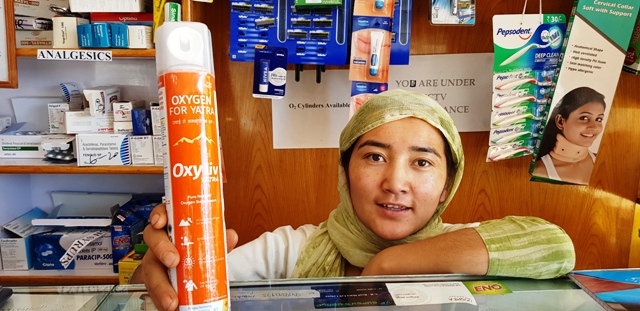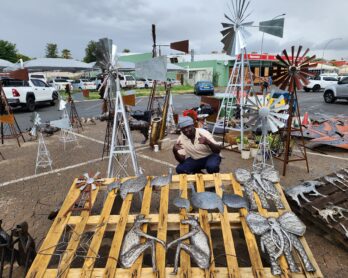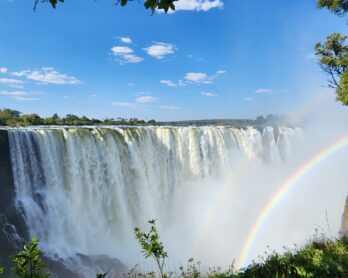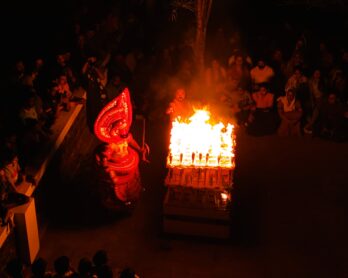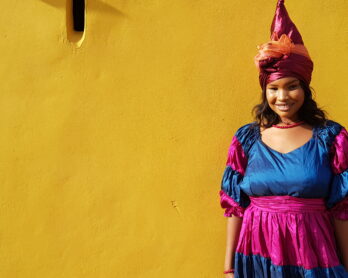Nothing comes in the way of your interaction with the locals other than laziness and prejudice; even an alien tongue doesn’t. I say this with conviction as I wrote a road tripping book on Chhattisgarh when there was no GPS (definitely not in Chhattisgarh) and my Hindi was pidgin at best (it still is). My friends were surprised to see that I actually returned after 40 days on the road in this heavily forested central Indian state besieged with its own set of unique problems. I made up for all my paucities by being genuinely warm and curious and smiling a lot. To be honest, I was helping myself: Even if you do have access to an exhaustive must-see, eat, do and buy list, nothing comes close to that one insider tip which opens up a forest at night or leads to the discovery of the last remains of a glorious past usually overlooked or ignored by the state. And publisher. Yes, I have many of these experiences from across India – all because I stopped the car and smiled. Or I pried gently, like I did in Leh, the hill country tackling a conundrum of deeper issues which usually renders the citizenry reticent to prodding of outsiders. But then, at the end of the day, we are all humans and it is human to want others to cherish a piece of ourselves.
We start with offering vignettes of our land.
Ali Hussain, taxi driver
Indian cabbies are characteristically garrulous but a few wear an eloquent anguish at times which I promptly attribute to the higher fare that never came. Their eyes are poised to roll and shoulders to shrug at your queries or humour. Soon enough they are induced to chat, surely, but it is mostly inanities, and if a city ride, smattered with profanities. The credibly informed cabbie – who is serious about educating you – is a rarity. I am yet to come across one like Jason in the Teju Cole essay, Always Returning, for the kind of erudition and information; I did look up Carolyn Grace – she is indeed a grand dame in her sixties who flies a Spitfire!
Though Ali Hussain was habitually laconic, there was a ready smile and buoyant nodding at most of the things I said. On our day trip heading out of Leh town, we passed by a convoy of army trucks and he mentioned that he used to drive one of them for a road building organisation. Why did he leave? Didn’t it pay better? The job – which was contractual – he got by dint of connections of his father who had a long service in the police department. He appeared for the test which was to make it permanent but flunked the medical.
“Do you believe that?” He turned towards me with a ferocious incredulity. “I could outrun a mountain goat during those days” He glanced outside the window at the snow-capped mountains fringing the horizon. A film of calm spread across his face almost immediately and he simpered at some memory. He told me about Pune where he went for the test.
“That was my first trip out of Leh. I went by train with no reservations and made a lot of friends during the journey.” From my own experience I told him that ticketless travel was a great way to make friends.
He turned towards me again now with a severity one assumes while confiding a life-changing secret.
“You know, the higher you go it’s not about what you can do but who you know.”
Ali didn’t go to school as he was the eldest and there was the lucrative livestock to look after at home. He grew up and became a driver like everybody else in Leh. But with his kids he is taking no chances.
“I am sending them to the best school I can afford.”
Avny Lavasa, deputy commissioner
Meltwater had clogged parts of the airport delaying my return flight from Leh. I sat in a crowded lounge sifting through photographs: Avny Lavasa, IAS, the deputy commissioner of Leh whom I had interviewed the previous day had told me she didn’t like smiley photographs of herself. But as she said this she was smiling and I happened to be clicking.
“That’s our DC,” exclaimed the airport employee who was sitting next to me. I turned to look at him – his eyes were lit up and he looked at me beseechingly. Before I met her I had gathered the distinct impression that she was well-regarded. A doer. And like scrupulous doers, she too had her fair share of controversies. She was in the news for taking on the ruling nationalist party head on for alleged misdemeanour during the recent general elections. Perfectly preened feathers were ruffled but she retained her seat as the DC – which she has been occupying since September 2017 – showing the support she enjoyed among the people. Fans on social media have been appealing for her continued service for another 15 years.
I walked into her office near the Polo Grounds overlooked by the white Leh Palace against a pale sky. Travel agents and other innominate crowds milled for inner line and other permits which got the economy going. Subdued laughter rose from small groups awaiting their turn from badinages and recounting tourist experiences. The season was in full swing – better than the previous year. I was ushered into Lavasa’s office in no time; I have always believed that it was the officious who needed appointments. I had requested to know more about ‘Tsangdra’ – the cleanliness drive which was an initiative spearheaded by the DC herself. The trash I had seen piling up along the banks of the Pangong Tso had appalled me; riling me up more was that there were no trash cans where one could actually bin it either.
“Are you worried that plastic trash bins might kill the scenery?” I asked. It definitely would. Even if they were made to look like faux boles or amiable apes.
“We can tuck them away from coming in the way of the view,” she said. “But currently we are figuring how to dispose this collected waste.” The Ladakh Autonomous Hill Development Council, entrusted with the development of Leh, was almost there. Lavasa was the CEO.
“The LAHDC had already established waste collection centres in Pangong and we are currently spreading awareness among the locals and – equally importantly – the tourists,” she said.
For the tourists, a campaign was being planned which would begin right from the airport itself. It would harness the power of social media like Facebook and Instagram through photography and story writing contests.
“No, I don’t think it is too late to save the Pangong Tso. And save it from trash, we shall.”
Konchok Angmo, pharmacist
“Diamox and Imodium.”
I told her.
“You’ll need more than that.” She replied.
What do you know, pretty one.
I thought, coyly.
I’ve been running and doing weights.
I can squat an eighty, despite a bad back.
And done the Leh run.
Twice already.
“I don’t think so.” I told her.
Squared my shoulders and smiled.
“I was telling you about these.” She said.
Oxygen bars, they were called.
What the cylinders begot, I thought.
One was six fifty, two for thousand.
They were a deal, alright.
“Julley!”
Nawang Tsering Shakspo, cultural historian
The leathery tan from a crystallised sun renders the face of the hill dweller timeless. When Shakspo told me about the trekking expeditions he used to organise in 1975, – the year I was born – when Ladakh wasn’t even a blip on the tourist map, it wasn’t difficult to picture him at it. At the head of pony wagons, coolies and climbers consisting mainly of Europeans probably from the National Geographic or other societies devoted to mapping hitherto unexplored regions, leading them across levees and mountain passes. He eventually went on the join the Jammu & Kashmir Academy of Art, Culture and Languages as a culture officer.
“I would say those were the golden years of Ladakhi culture, there were many who wanted not just to talk about it but actually do something about preserving it.” Shakspo himself was invited to give talks in America and Russia about his land and its rich lineage. Later on he would bring out the authoritative tome ‘A Cultural History of Ladakh’ which has gone into several editions. Currently he edits the annual ‘The Ladakh Review’ and devotes his time to preserving the hill language – its ethnic version – and the folk tradition which is steadily eroding from the present day milieu.
“The government hasn’t recognised the Ladakhi language officially even though it is spoken by most of the pioneer settlers and their descendants,” he said. The reason for this, he feels, could be that if recognition is granted, then by extension the government would be recognising Tibetan too where Ladakhi has its roots.
“We are probably pre-empting a moral victory for the Chinese by this,” he said with a wicked grin.
The fault, he said, was not just that of the government but the people too.
“For the government to take note, we have to put up a strong, united front. But in Ladakh now every ethnic group is busy fighting to promote their own agenda.”
Punchok Angmo, newsstand owner
No market is complete without that lone shop selling magazines or stationery. In the maze of shops in Leh main bazaar area selling pashmina shawls and antique curios this one was like a beacon which led me to a familiar shore where the wares were easily affordable and transportable through customs. I always make it a point to pick up whatever local dailies and magazines available in these shops and to chat up the newsstand owner who are better informed than any news anchor and insightful than an editorial. If the museum tells you what the land went through in the past, the newsstand owner will tell you what it’s going through now. Definitely an overview is there for the asking. Punchok Angmo draped an elegant dupatta around her head and leaned forward. I readied myself to take notes on the diary I bought from there itself.
“The Kushok Bakula airport where you landed. Do you know whom it is named after?” More rhetoric even though I didn’t know the answer.
“Kushok Bakula, the first Member of Parliament from Ladakh.”
Angmo went on to tell me how the Ladakh parliamentary constituency is the largest in India in terms of area but had no representation in the Indian Parliament till the fourth general elections in 1967. Kushok Bakula Rimpochee was the first MP from Ladakh, a monk, who was elected unopposed.
“But nowadays politics is dividing the whole of Ladakh,” Angmo winced. When Leh was declared as the headquarters of Ladakh, protests erupted in Kargil who demanded the headquarter status rotate between Leh and Kargil. Similarly with infrastructure for the newly proposed Ladakh university.
Angmo emphasised on the need to hold dialogues between different religious, communal and ethnic communities before taking any important decision.
“The governor Malik has to wait for protests to erupt all over Ladakh before he finds out that Leh is not Ladakh.”
Stanzin Gyalson, businessman
The reason I, like many others, choose homestays to hotels is the people factor. If I am not travelling on work I can give up a lot of amenities if it amps up host interaction. Of course, hotels have travel desks. Then, they are still desks – you are on the other side. Gyalson sat with me at the breakfast table. At my request he gave me an overview of the tougher treks in the region and promised to put me in touch with some of the most experienced trek organisers. The homestay he ran was one of the oldest and most reputed ones in Leh. He knew the hospitality business inside out and did not desist from calling a spade a spade.
“There are some all-weather hotels coming up in Leh,” he said. By ‘all-weather’ he meant hotels that could stay open all round the year. “But this is going to be bad for Leh in the long run. We don’t want another Shimla in Leh.” Shimla, arguably a more popular – probably by dint of easier access – tourist destination than Leh, ran out of water this year. The enraged locals started badgering the tourists to return home presto.
The reason Gyalson says hotels that remain open round-the-year are bad is because of the precarious groundwater situation of Leh.
“Anywhere you pump water in Leh, you will get water continuously for only half an hour and then it stops,” he said. “The winter season – November to March – when traditionally the hotels were closed was a blessing in disguise. This was when the snow on the ground melted and the groundwater was replenished.”
Tame estimates put the number of hotels that have opened in and around Leh over the past two years at not less than 1,000. What is rattling is that these hotels are not even considering the availability of groundwater, instead, banking on water tankers to keep the business running.
“Borewells have been dug in the hundreds across Leh which has further depleted the water levels. When I was a kid, there used to be scores of springs around town which were brimming with clear, potable water. Now, there is not even a single one.”
Sunil Thakur, itinerant chef
Barely we started to talk when Sunil Thakur showed me his Instagram handle. In a way it made sense – I could see more of the fully-jacketed Thakur. Well, literally too – he was flexing his perfectly-formed biceps in a secluded lagoon in Goa wearing a pair of skimpy trunks. In a way he was expressing what he was pining for as well – for the tourism season to start in Goa.
“I am from Dalhousie (Himachal Pradesh) and Leh is just a stopover for me,” he wasn’t trying very hard to cover his disdain of the place. “I am here because half the world is here.” We had bonded over baking, I mean I had fallen in love with his baking and had come to his coffee shop for the third straight day. In return, he had given me a tour of his large oven surrounded by little and large baking vessels – almost like an artist’s workshop with scattered palettes. I am, as I deliver impressively during the early days of a courtship, one man who can live on bread alone.
What was wrong with Leh? Why didn’t he like the place? I wanted to know. For me this was paradise after the blast furnace 46 degrees of Delhi. Nothing wrong with the place, he assured.
“Migrant workers always face resistance from the local workforce,” he explained. And Leh was no exception. “Everything would have been honky-dory if business was good. But the season is dull since the past three or four years.” But experience held him in good stead and he managed to pick up lucrative jobs wherever he went.
“I worked with McDonald’s, KFC, Pizza Hut, you name them, I have baked for them,” he said with unabashed pride.
Come September, he is looking to fling himself like Tarzan into Goa. Into the private lagoon and the property in Palolem – where he has a share in the proceeds too.
“You must come,” he said showing me his Insta page again.
(There were others too. Like the monk at the Hemis monastery who apprised me of their tough ritualistic life including begging for food in the nearby villages certain days of the week. There was the guy who promised to ‘arrange’ artefacts to be shipped to my address, any address, for a price. They both refused to be photographed – for different reasons of course.)


